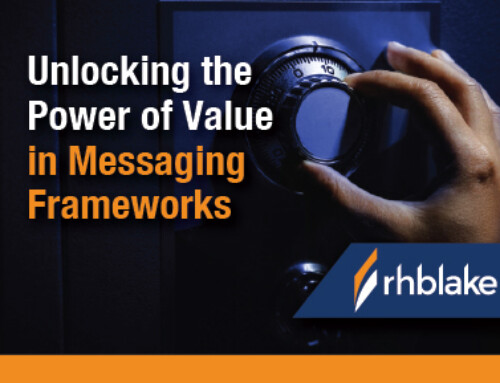MQL vs. SQL for Manufacturers
Written by Dan Konstantinovsky
Strategic Marketing, RH Blake
![]()

No, it’s not just semantics. The vocabulary of your lead qualification funnel is significant. Terminology matters, and it’s essential that everyone within a company be aligned regarding these two terms in particular.
A challenge is to clarify the difference between a marketing qualified lead and a sales qualified lead. Especially for manufacturers with complex go-to-market approaches, it is vital that definitions are clear, as these will guide marketing and sales teams to appropriate next steps. If the line between these two terms becomes blurred, communication breaks down, and marketing effectiveness suffers.
This breakdown is evident in a large percentage of companies. MarketingSherpa reports that 61% of B2B marketers send all leads to sales, despite the fact that only 27% are qualified. Further, research by the TAS Group reveals that sales teams typically ignore 50% of the marketing leads sent their way.
What’s going on? Lead qualification needs clarification. To minimize missed opportunities, manufacturers must ensure everyone on their teams understands exactly what to label as a marketing qualified lead (MQL) and a sales qualified lead (SQL). Here’s the difference.
What is a Marketing Qualified Lead?
A marketing qualified lead has shown interest in your offerings. MQLs have visited web pages, downloaded content, or engaged in other similar activities that indicate their interest. Due to this interaction, MQLs are considered more likely to complete the sales cycle than other leads. However, these leads are not yet indicating their interest in purchasing. As a result, they should be nurtured with marketing efforts to move further along the pipeline.
Manufacturers can use closed-loop analytics to determine who and when a lead becomes a marketing qualified lead. Each business must establish specific parameters for these analytics that fit their systems and goals. For most, engagement and revenue are key factors.
What is a Sales Qualified Lead?
A sales qualified lead is further along in the sales process than an MQL. This lead has moved beyond solely interest in your offerings and recognizes that you have a product or service that could solve their existing challenge. The lead has been vetted, fits the profile of your target buyer, and is considered ready to approach for a sale.
What is the Difference Between MQLs and SQLs?
To determine whether a lead should be considered an MQL or SQL, consider using the following chart.
| MQL | SQL |
|---|---|
| Aware of their challenge | Aware your product may solve their challenge |
| Shows interest/engages with your content | Considering your offering as a solution |
| Unresearched; not vetted | Researched; fits your buyer profile |
| Not ready to buy today | Ready to buy |
| Visitor | Sales Lead |
| Not ready to be approached by sales team | Ready to be approached immediately |
For effective marketing strategies that attract buyers and generate qualified leads, contact RH Blake at [email protected] or 216-595-2400.
“One [MQL] criteria that has been important for us is engagement. We have a system where we measure the types and quantities of engagement with our company. That could be different types of content, events, our website, etc. We use that as a key indicator of active interest and to justify spending time and resources with those people as potential customers.”
– Trent Maw, Sr. Director of Marketing, Leading2Lean
We measure lead quality in all of our marketing programs, more so now than ever. For us, it boils down to revenue. Did this particular campaign pay for it’s worth in a return on investment?
Far too often, marketing professionals value interaction or engagement as a tangible key performance indicator because that’s the only recordable data they can get. But that shouldn’t ever be the goal or the fallback.
My team has moved our efforts towards a revenue-based approach. If we spend x-amount on a print advertisement or a tradeshow, as long as our efforts grew revenue, at least to cover the expense of the campaign itself, we consider it a success. If not, this allows us to take a hard evaluation on the messaging of the campaign or the validity of doing that campaign in years to come. This approach really expels the value of marketing as a whole and allows us to make decisions that make the most of our spend.”
– Timothy Rodman, CPMM, Marketing Supervisor, Schroeder Industries
MQL vs. SQL for Manufacturers

Written by Dan Konstantinovsky
Strategic Marketing, RH Blake
![]()
No, it’s not just semantics. The vocabulary of your lead qualification funnel is significant. Terminology matters, and it’s essential that everyone within a company be on the same page regarding these two terms in particular.
The challenge is to clarify the difference between a marketing qualified lead and a sales qualified lead. Especially for large organizations with complex operations and larger funnels, it is vital that definitions are clear, as these will guide marketing and sales teams to appropriate next steps. If the line between these two terms becomes blurred, communication breaks down, the funnel fails, and leads are lost.
This breakdown is evident in a large percentage of companies. MarketingSherpa reports that 61% of B2B marketers send all leads to sales, despite the fact that only 27% are qualified. Further, research by the TAS Group reveals that sales teams typically ignore 50% of the marketing leads sent their way.
What’s going on? Lead qualification needs clarification. To avoid leaving money on the table, businesses must ensure everyone on their teams understands exactly what to label as a marketing qualified lead (MQL) and a sales qualified lead (SQL). Here’s the difference.
What is a Marketing Qualified Lead?
A marketing qualified lead has shown interest in your offerings. MQLs have visited web pages, downloaded content, or engaged in other similar activities that reveal their interest. Due to this interaction, MQLs are considered more likely to complete the sales cycle than other leads. However, these leads are note yet poised to buy. They are positioned to be nurtured with strategic efforts to move further along the pipeline.
Companies can use closed-loop analytics to determine who and when a lead becomes a marketing qualified lead. Each business must establish specific parameters for these analytics that fit their systems and goals. For most, engagement and revenue are key factors.
What is a Sales Qualified Lead?
A sales qualified lead is further along in the sales process than an MQL. This lead has moved beyond mere interest in your offerings and recognizes that you have a product or service that could solve their problem. The lead has been vetted, fits the profile of your target buyer, and is considered ready to approach for a sale.
What is the Difference Between MQLs and SQLs?
To determine whether a lead should be considered an MQL or SQL, use the following chart.
| MQL | SQL |
|---|---|
| Aware of their problem | Aware your product may solve their problem |
| Shows interest/engages with your content | Considering your product as a solution |
| Unresearched; not vetted | Researched; fits your buyer profile |
| Not ready to buy today | Ready to buy |
| Visitor | Sales Lead |
| Not ready to be approached by sales team | Ready to be approached immediately |
For effective marketing strategies that attract buyers and generate qualified leads, contact RH Blake at [email protected] or 216-595-2400.
“One [MQL] criteria that has been important for us is engagement. We have a system where we measure the types and quantities of engagement with our company. That could be different types of content, events, our website, etc. We use that as a key indicator of active interest and to justify spending time and resources with those people as potential customers.”
– Trent Maw, Sr. Director of Marketing, Leading2Lean
We measure lead quality in all of our marketing programs, more so now than ever. For us, it boils down to revenue. Did this particular campaign pay for it’s worth in a return on investment?
Far too often, marketing professionals value interaction or engagement as a tangible key performance indicator because that’s the only recordable data they can get. But that shouldn’t ever be the goal or the fallback.
My team has moved our efforts towards a revenue-based approach. If we spend x-amount on a print advertisement or a tradeshow, as long as our efforts grew revenue, at least to cover the expense of the campaign itself, we consider it a success. If not, this allows us to take a hard evaluation on the messaging of the campaign or the validity of doing that campaign in years to come. This approach really expels the value of marketing as a whole and allows us to make decisions that make the most of our spend.”
– Timothy Rodman, CPMM, Marketing Supervisor, Schroeder Industries









